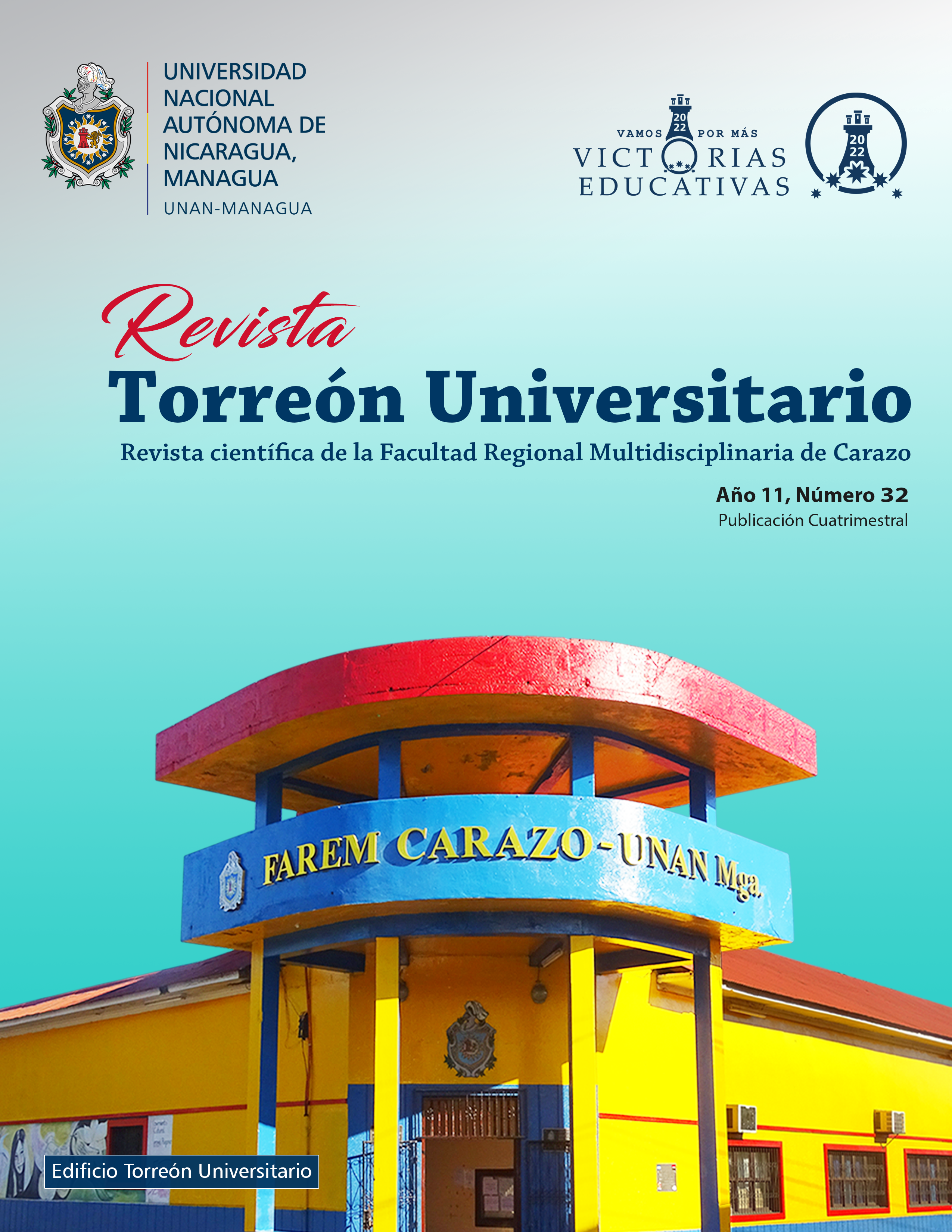Methodologies for the learning by competencies of Differential Equations applied in Physics when using technology in the career of Mathematical Physics
DOI:
https://doi.org/10.5377/rtu.v11i32.15065Keywords:
learning, differential equations, Physics, methodologies, technologyAbstract
This research work was developed in its first stage to answer the question: how should methodologies be available for learning by competencies of Differential Equations applied in Physics when using technology in the career of Mathematical Physics of the Regional Multidisciplinary Faculty of Estelí, UNAN-Managua? This arose on its initiative, faced with the observation of the difficulties that students present when relating Mathematical equations in components of Physics, not being able to acquire learning or achieve the necessary skills.
The study is approached from a mixed approach with qualitative predominance; in the inquiry, the inductive process is used, because the researcher will interact with the students and the data that emerge during the path traveled. The proposal of methodologies takes the components of Physics of the Plan 2021 of the UNAN – Managua, where differential equations are applied, to define methodologies, which can be adapted to the creation of Action Guiding Bases (BOA), pedagogically mediated documents and manuals, for the correct use of software and technological applications, that in today's world cannot be ignored.
Downloads
References
Aburto Jarquín, P. (27 de Febrero de 2020). El modelo curricular por competencias aflora logros en el trabajo integral en los profesores y muy especialmente en los estudiantes. Una muestra como evidencia. Obtenido de https://www.unan.edu.ni: https://www.unan.edu.ni/wp-content/uploads/El-modelo-curricular-por-competencias-aflora-logros.pdf
Arias Odón, F. G. (2012). El proyecto de investigación. Introducción a la metodología cientifíca (Sexta ed.). Caracas: EPISTEME. Recuperado el 30 de Diciembre de 2021, de https://n9.cl/ze9g
Ávila Baray, H. L. (2006). Introducción a la Metodología de la Investigación. México: EUMED.NET.
Blandón Dávila, M. E. (2017). Propuesta metodológica para el proceso de enseñanza-aprendizaje de la unidad de Álgebra en la asignatura de Matemática General en la Facultad Regional Multidisciplinaria FAREM-Estelí, UNAN-Managua. Tesis para optar al grado de doctora en Matemática Aplicada, Estelí, Nicaragua. Recuperado el 5 de Marzo de 2021, de https://repositorio.unan.edu.ni/8818/
Gamboa Graus, M. E., & Borrero Springer, R. Y. (2016). Influencia de la contextualización didáctica en la coherencia curricular del proceso enseñanza-aprendizaje de la Matemática. Dilemas Contemporáneos: Educación, Política y Valores, 1-31.
González, N., Zerpa, M. L., Gutierrez, D., & Pirela, C. (2007). La investigación educativa en el hacer docente. Laurus, Revista de Educación, 13(23), 279-309. Recuperado el 1 de Febrero de 2021, de https://www.redalyc.org/pdf/761/76102315.pdf
Granera Rugama, J. A. (2017). Proceso de enseñanza–aprendizaje de la integral definida como el área bajo una curva en las asignaturas de Cálculo en las carreras de Ingeniería. Tesis presentada para optar al título de Doctor en Matemática Aplicada, FACULTAD REGIONAL MULTIDISCIPLINARIA, CHONTALES, Estelí, Nicaragua. Recuperado el 14 de Marzo de 2021, de https://repositorio.unan.edu.ni/8823/
Grimaldo Muchotrigo, M. (2009). investigación cualitativa. Manual de la investigación en psicología. Recuperado el 19 de Diciembre de 2021, de https://n9.cl/2bpnc
Hernández, R., & Mendoza, C. (2018). Metodología de la Investigación. Las rutas cuantitativa, cualitativa y mixta. México: McGraw-Hill Interamericana Editores. Recuperado el 12 de Marzo de 2020, de https://acortar.link/i9VQOr
Herrera Castrillo, C. J. (2022). Aprendizaje de ecuaciones diferenciales aplicadas en física utilizando tecnología. Revista Torreón Universitario, 11(31), 26-35. Obtenido de https://revistatorreonuniversitario.unan.edu.ni/index.php/torreon/article/view/416/842
Medina Hidalgo, M. I. (2017). Estrategias metodológicas para el desarrollo del pensamiento lógico-matemático. Didasc@lia: Didáctica y Educación, 125-132.
UNAN Managua. (2020). Documento Curricular de la Carrera Fisica Matemática.
Vargas Leyva, M. R. (2008). Diseño Curricular por Competencias. México: Asociación Nacional de Facultades y Escuelas de Ingeniería. Recuperado el 10 de Febrero de 2022, de https://www.gob.mx/cms/uploads/attachment/file/182548/libro_diseno_curricular-por-competencias_anfei.pdf
Zavala Arnal, C. M., & Salinas, J. R. (2017). La Interdisciplinariedad En El Aula De Educación Secundaria: Una Investigación A Través De La Opinión Del Profesorado De Las Áreas De Música, Lengua Castellana Y Literatura, Y Ciencias Sociales. European Scientific Journal, 13(19), 281-291. Recuperado el 29 de Diciembre de 2021, de https://eujournal.org/index.php/esj/article/view/9637
Published
How to Cite
Issue
Section
License
Copyright (c) 2022 National Autonomous University of Nicaragua, Managua.

This work is licensed under a Creative Commons Attribution-NonCommercial-NoDerivatives 4.0 International License.
The authors who publish in this journal agree to the following terms.
- The author or authors of the articles, essays or research grant the National Autonomous University of Nicaragua, Managua (UNAN-Managua) the editing rights (copyright) of the submitted work, therefore the University has the exclusive right to publish the article for the entire copyright period.
- These copyrights/authors authorize Torreón Universitario Magazine and the University to edit and disseminate/publish the article in said Magazine, including printed and electronic reproduction, storage, retrieval and any other type of publication, and sources of secondary information as services. of summaries and databases, they also empower it to protect the article against unauthorized use for dissemination by printed or electronic media (PDF, HTML, EPUB, XML or others).
License for use of content
The magazine uses the Creative Commons Attribution-NonCommercial-NoDerivs 4.0 International License.
Under this statement:

This journal is licensed under a Creative Commons Attribution-NonCommercial-NoDerivatives 4.0 International License. It can be copied, distributed and transmitted publicly as long as the author and source are cited (Revista Torreón Universitario), it should not be modified or used for any commercial purpose. The full license can be found at http://creativecommons.org/licenses/by-nc-nd/4.0/.



